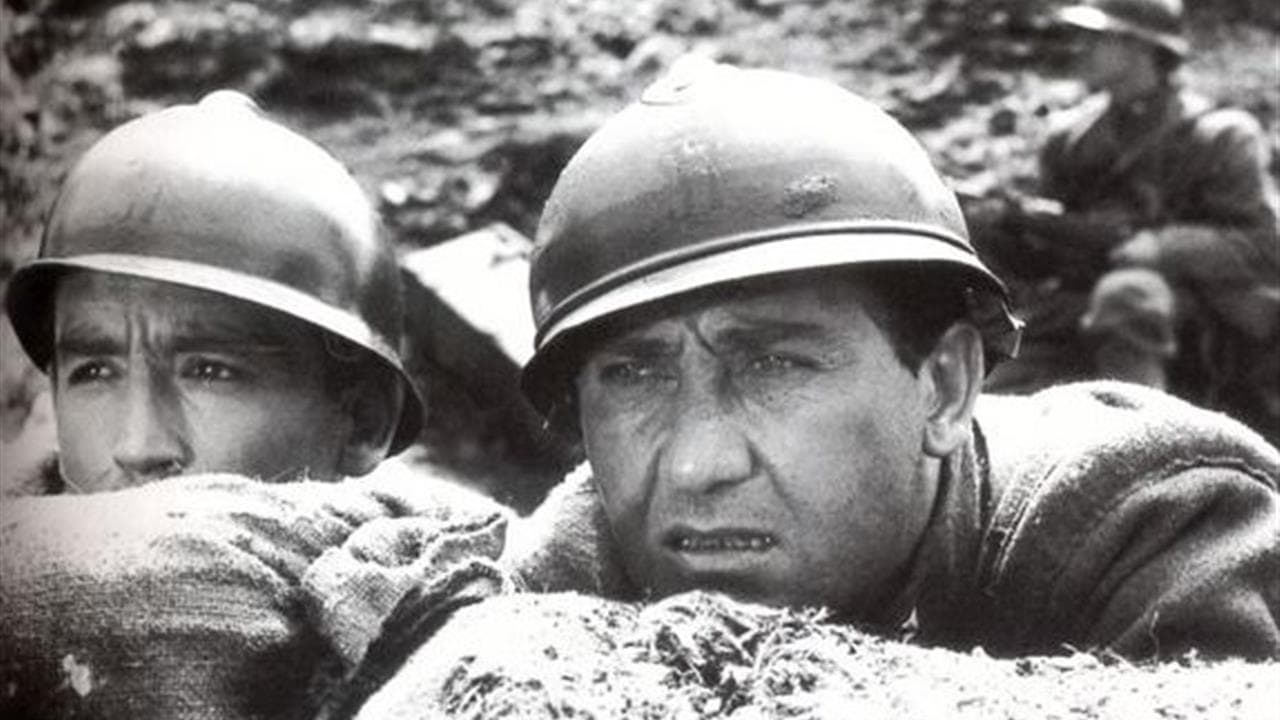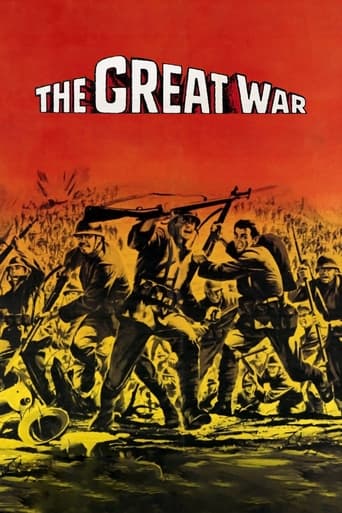

Takes itself way too seriously
... View MoreAdmirable film.
... View MoreI was totally surprised at how great this film.You could feel your paranoia rise as the film went on and as you gradually learned the details of the real situation.
... View MoreEach character in this movie — down to the smallest one — is an individual rather than a type, prone to spontaneous changes of mood and sometimes amusing outbursts of pettiness or ill humor.
... View MoreWinner of the 1959 David (Italy's equivalent of the Oscar) Award for Best Film (shared with Generale della Rovere). Winner of the 1959 Venice Film Festival's Golden Lion for Best Film (also shared with Generale della Rovere). Alberto Sordi was voted Best Actor of 1959 for his performance in The Great War by the Syndicate of Italian Film Journalists. The Syndicate also voted Garbuglia's art direction as the best of the year. Nominated for the 1959 Award for Best Foreign Film, The Great War lost to Black Orpheus. COMMENT: For the most thrilling and effective use of genuine CinemaScope, it's hard to go past Mario Monicelli's La Grande Guerra. In this exceptionally lavish recreation of WWI Italian battlefields, Monicelli never allows a single square foot of waste space to appear on his screen. Instead his images are constantly crowded — almost always with men: ragged men, jostling men, cheering men, fighting men, slaughtered men, training men, retreating men, advancing men, hungry men, weary men, stupid men, brave men, victimized men, dead men. Vast columns of marching men are stretched across the screen, thousands often forming just a distant background to the forefront knockabout. Monicelli's idea was obviously to fill his screen to bursting with overflowing action. Somehow he has managed to persuade the producer to open his purse and spend more money on soldiery than Selznick did on Gone With The Wind. Just as the overwhelming hideousness of it all is beginning to lose its power, Monicelli skilfully pulls off a last-minute twist that drives home the film's firmly pacifist message with uncommon force. I'm not a fan of Vittorio Gassman, especially not Gassman in boisterous mode as here — well cast though he may be. But Sordi is ever appealing. Miss Mangano is saddled with a conventional and unlikely characterization which she plays with spirit if not conviction. Folco Lulli effectively repeats his Wages of Fear vignette. Blier's performance seems tired, but the Italian dubbing of his dialogue makes it difficult to judge. The other players are unknown to me, but all these minor roles were credibly cast, with Elsa Vazzoler especially compelling as Bordin's wife and Gerard Herter suitably menacing as the Austrian captain. It's true that the 140-minutes version does seem just slightly too long towards the two-hour mark, though, as said, interest is cleverly lifted soon after. The problem is, what scenes to cut? Those that could easily be removed with little loss of continuity are often the most effective and affecting. Personally, I'd take out Gassman's first long scene with Silvano Mangano — but no exhibitor in his right mind is going to do that!
... View MoreThe Italians don't have a problem making fun of serious things. Roberto Benigni got the whole world laughing with a Holocaust movie. Lina Wertmüller satirized man's will to survive in her WWII dark comedy, Pasqualino Settebelezze. Mario Monicelli's La Grande Guerra, perhaps the grandfather of such movies, aims its satire at World War I.The movie follows Giovanni Busacca and Oreste Jacovacci, two comical anti-heroes who are drafted and spend most of the time trying to find ways to stay out of the front or acquire some rare comforts amidst the war. The movie is mostly plot less and instead emphasizes amusing episodic situations. This gives the movie maximum freedom to explore as many situations as the imagination of the screenwriters allowed.However this movie never stoops to frivolity. Amidst the horrors of war, there's a strong criticism of war in general and also of the way the soldiers are treated by their own country. Monicelli's camera shows the squalor of the trenches, the hunger, the worn boots and uniforms. The battles are bloody, chaotic situations; when it shows Giovanni and Oreste watching a bombardment in the distance, we share with them the relief we're somewhere else. We rejoice when they think their way out of a dangerous situation and commiserate with them over fallen friends.And like the best war movies, La Grande Guerra manages to show the best of mankind. Comradeship, selflessness, courage, loyalty are in display here.La Grande Guerra is over 50 years and yet remains an impressive experience. Modern movies can be technically more authentic, have better sfx, better make-up, have better sound mixing, etc., but $100 millions of budget won't buy them the emotional core of this forgotten movie.
... View More(Includes spoilers!) THE GREAT WAR stands as one of the essential films exemplifying the "commedia all'italiana" genre, that is, films which while being comedies often have a serious, even tragic undertone. Take our two heroes here, the Roman Oreste Jacovacci and the Milanese Giovanni Busacca (Alberto Sordi and Vittorio Gassman). Caught in the insanity of World War I, this Abbott and Costello duo will do anything to escape danger and responsibility. After being fairly successful at the game, they have the misfortune to fall into the hands of the enemy Austrians, who want to pump them for information. But these two connivers and shirkers, in a rush of untapped patriotism, are unwilling to cause the possible deaths of their compatriots and so will chose or allow themselves to die instead. Circumstances turn cowards into heroes, much in the same way the con-artist played by De Sica in IL GENERALE DELLA ROVERE soars to lofty nobility at the end of that film, completed that same year. Talented director Mario Monicelli has filmed a gritty panorama of the World War I, Italy's first real film on the subject, in which the visuals and the overall "feel" are utterly convincing. The great cinematographer Giuseppe Rotunno has captured the same period feeling that is akin to old-photographs-come-to-life that we would see later in his 1963 I COMPAGNI (THE ORGANIZER). Here he works in wide-screen CinemaScope that is especially effective in following movements of large numbers of soldiers in the battle scenes. The music by veteran Fellini-composer Nino Rota is appealing, and we get the songs and popular chants of the era. Silvana Mangano provides feminine interest as a crafty prostitute. This is a major Italian film of the 1950's and it should be far better know
... View MoreI think this is one of the italian masterpieces of all times, disguised as a "comedy", just because the main characters are the best italian comedians of all times, Sordi and Gasmann. I would call it the "Divina Commedia" of comedy and of deep feelings against war but for the defense of one's country.
... View More